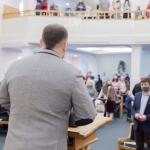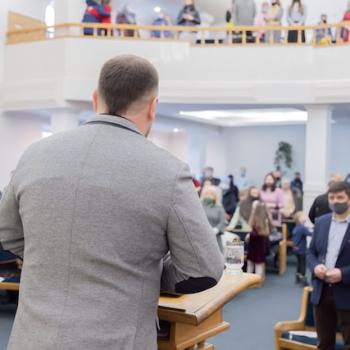
I’m not ashamed to say it. These days, I take sermons with a grain of salt.
This has nothing to do with the wonderful preaching team at my current church. It’s more a reflection on what preaching is meant to be in general, and how we can engage with sermons in healthier ways.
From Starry-Eyed in Love…
When I was in college, I was part of a local campus chapter of an international campus ministry organization. And I loved our weekly Christian fellowship group meetings.
By the time I was an upperclassman, I began to realize how much the weekly messages during these meetings catered to freshmen. They tended to cycle back and repeat themselves every year or two.
But as a freshman, I was in love. Not with our lead campus staff worker, let’s call him Tim, but with the things he would say about God and the Bible and Jesus and community and a life of faith. I drank it all up eagerly. I hung on Tim’s every word.
…To Finding Some Shortcomings
As with most sets of teachings, though, taught by flawed humans, there were some true gems in there—but there were also some messed-up things.
In this case, the messed up things Tim taught us included the idea that leading Bible study groups as a student—and then working for the campus ministry organization after you graduate—is the best possible thing you could be doing with your life.
Everything else is, well, a little less holy. A little less faithful.
As a student, I bought into it. Later on, I realized how messed up it was.
The goal for Christians should not be to contort ourselves to fit into one particular mold of what a Christian looks like—after all, it’s okay that we’re different—but to explore what our own God-given gifts, curiosities, and talents might be, and to find roles that let us bring all of who we are to the table. Roles that bring out the best in us, in all our glorious (and sometimes frustrating) uniqueness.
Most of my college friends and I came to recognize this, eventually. But in the interim, it harmed us.
Some students chose to spend time doing things other than leading Bible study groups and felt that they were considered less of a Christian. Other students dove into it all wholeheartedly, only coming to realize much later that it probably wasn’t the best fit for who they are.
Repentance…
A few years after I graduated from college, I was still somewhat connected to the local world of that campus ministry organization. And so, one summer, when I received an invitation to an event the organization was hosting that was open to alumni as well as current students, I went.
It was an evening focused on work and faith. How do we understand the connections between the work we do for forty (or more) hours every week and the Christian faith we want to embody in our whole lives? What are the tensions? What are the possibilities?
I don’t remember whether I knew, going into it, that Tim—now no longer working for the organization, but still connected to its world—would be one of the speakers. But there he was. Speaking just as passionately and compellingly as he ever did. But saying some very different things.
Tim spoke about a close family member’s serious illness, and how that changed the way he saw the world. He shared that he used to think going into ministry was the best possible thing people could do, but interacting closely with the medical system on behalf of someone so close to him had changed his mind.
Tim saw firsthand the work that doctors, nurses, and other medical professionals do, and what a difference it made for his family member. How they, along with the researchers behind the treatments his family member was given, saved his family member’s life. And he was eternally grateful.
Basically, Tim publicly repented of his former sin of trying to convince all of us college students that working in Christian ministry was the holiest thing we could do with our lives. He acknowledged that some are called to go into medicine, engineering, and all sorts of different fields—serving God there, in ways no less meaningful.
…a Little Too Late
Hearing this from Tim, a few years later, was healing in some ways. And it was frustrating in others.
I was glad that he, too, had come around to the realization that I and most of my friends had already come around to. But I also felt like it was a little too late.
Better late than never, of course. But what about all the students who had been influenced by Tim over the years? I felt like there was a need for more acknowledgment of the messed-up-ness—to all the students Tim had worked with, not just the couple of us who happened to show up for this one event—and maybe something by way of apology.
A Large Grain of Salt
Experiences like this have helped me listen to sermons differently. Every human preacher is a mixed bag. They’re right about some things and wrong about others. They believe some things now that they might totally change their minds about a few years from now.
I think it’s good to keep these things in mind as we listen. We can appreciate sermons and listen for what resonates with our souls. And we can engage our minds, hearts, and bodies in the important work of considering what we want to hold onto and what we want to let go.
We can look for what’s good without swallowing the whole thing, hook, line, and sinker.
After all, now that I preach sometimes, that’s what I want people to do when they hear me. I don’t want them to think the same way I do about everything. I want to offer food for thought that people can take, leave, or run with in all sorts of different directions.
I want to provide something meaningful for people to wrestle with. And I do want them to wrestle. I don’t want them to take my word for it.
A sermon isn’t—or shouldn’t be—a transfer of beliefs and values from the preacher to the listeners. It isn’t—or shouldn’t be—one person telling others what to do.
It’s just one person doing the best they can to speak truly, while acknowledging there is likely so much they are missing. It’s one person starting a conversation that others can then join in, adding their own experience and wisdom. It’s a community event, something experienced and wrestled with together.
This is how I see sermons now. I take them with a grain of salt. And I think that is a good thing.












